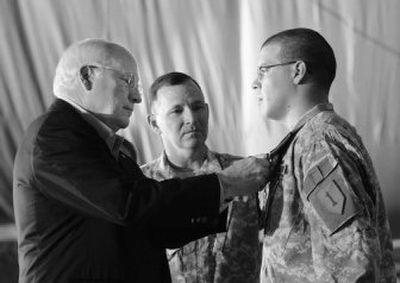Commander requests more troops

WASHINGTON – The commander of U.S. forces in northern Iraq said Friday he does not have enough troops to deal with the escalating violence in Iraq’s Diyala province, an unusually frank assertion for a top officer and a sign that American military officials may be starting to offer more candid and blunt assessments of the war.
Army Maj. Gen. Benjamin R. “Randy” Mixon also said that the Iraqi government has failed to help the situation in the restive province, adding that it has been a hindrance at times by failing to support local army and police forces. Diyala is an eastern Iraqi region bordering Baghdad, where many insurgents are fleeing in the wake of the ongoing buildup of troops in the Iraqi capital.
Mixon’s call for help coincides with a rise in the number of sectarian death squad killings in Baghdad after the U.S. had heralded a decrease in such deaths as a sign of success of the security clampdown that began Feb. 13 in the capital.
The Iraqi Interior Ministry said there were 234 death squad victims – unidentified men whose bodies were found strewn across the capital – in the first 11 days in May, compared with 137 in the same time period last month.
Mixon, speaking by teleconference from Camp Spicher outside Tikrit, told a Pentagon news conference Friday that he did not have enough soldiers to deal with security in Diyala province, adding that the local government is “nonfunctional” and the central government is “ineffective.”
“I’m going to need additional forces,” he said, “to get that situation to a more acceptable level, so the Iraqi security forces will be able in the future to handle that.”
There is one U.S. Army brigade now in the province, or about 3,500 troops, compared with 10 brigades in and around Baghdad and four in Anbar. Sixty-three U.S. soldiers have been killed in Diyala so far this year, compared with 20 last year, according to the independent Web site icasualties.org.
Mixon emphasized that he had asked for more troops shortly after arriving in Iraq last September, well before the U.S. troop buildup was started in Baghdad.
He said he had been given a battalion in reinforcements, or about 800 soldiers, and that Lt. Gen. Raymond T. Odierno, the day-to-day commander in Iraq, has said he would send additional forces when possible.
“The level of violence began to increase before the surge,” Mixon said. “It has increased, of course, during the surge … (because) we are sure that there are elements, both Sunni extremist and Shia extremist, that have moved out of Baghdad.”
It is rare for an officer of Mixon’s rank to publicly call for more troops. When Donald H. Rumsfeld was secretary of Defense, there were intense pressures on officers to not make such requests, even privately, according to officers who served in Iraq.